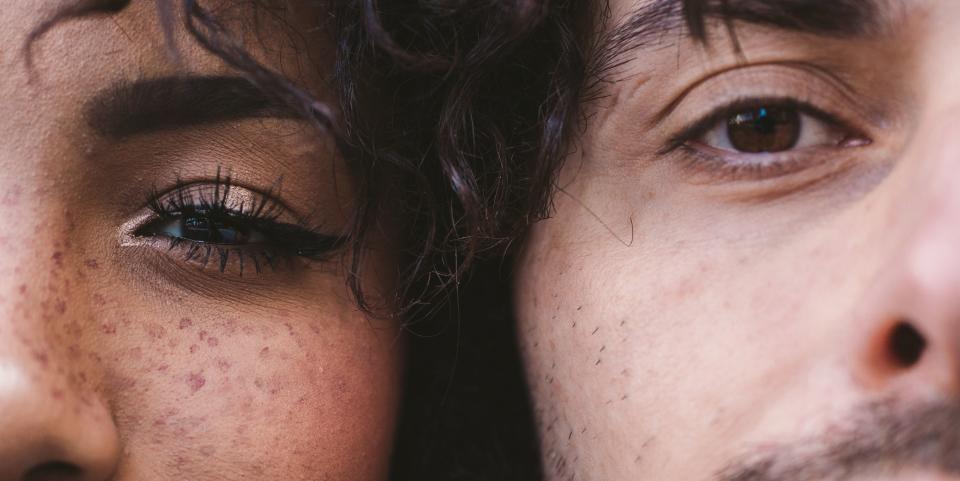Here's how to use dating apps without damaging your mental health

Tinder, Bumble, Hinge... there are multiple dating apps to choose from when it comes to meeting your next potential love match. While these apps can be fun, light-hearted and even lead you to 'the one', if you suffer from anxiety or low-esteem, it's important to take precautions when it comes to your mental health.
We speak to relationship and mental health expert Sam Owen, author of Anxiety Free and founder of Relationships Coach, about how to navigate the murky waters of online dating unscathed:
Can dating apps impact your mental health?
The short answer is yes, dating apps can negatively impact your mental health if you're not using them in a healthy way, and particularly if you have previously battled with anxiety or depression.
Despite the huge popularity of dating apps, many users report feeling low and experiencing self doubt. A study by the University of North Texas, found that male Tinder users reported lower levels of self worth than those not on the dating app.
'They make us focus on superficiality instead of focusing on what’s really important in relationships such as friendship, commitment and shared values,' says Owen. 'This in itself can knock self-esteem and can also force people into pursuing goals that aren’t important, such as looking good in a photo.'
Low self-esteem is a risk factor of a large number of mental health issues, including but not limited to depression.
'The time we spend on superficial goals is time we can’t spend on important goals such as finding someone we can have a lasting love with,' Owen points out, 'or working on our psychological issues such as raising our self-esteem and letting go of emotional baggage.'
The other issue with dating apps is that they put you face-to-face with rejection, which can in turn have negative psychological impact. 'The more rejections you get, the more deflated and exhausted you can become and this can make a person feel hopeless,' adds Owen.
Mental health and online dating red flags
Sometimes, it's natural to feel a bit down if things aren't going according to plan. So how do you make the most of online dating and still keep your self-esteem in check?
Owen outlines the key warning signs to look out for that might be negatively affecting your mental health. If you start to experience any of these, log off and go for a walk, put the kettle on or phone a friend until the feelings subside:
• Psychological anxiety symptoms
Feeling nervous, ‘on edge’ or panicky when you are about to log on to the app.
• Physical anxiety symptoms
Increased heart rate, nausea or tight chest when you're using the app.
• Negative self-talk
Your internal dialogue is one of hopelessness or dejection.
How to use dating apps in a healthy way
The key to successful online dating is to always put your mental health first. Owen recommends the following tips before you log on:
✔️ If you are feeling low generally, it is important to avoid dating apps so as not to exacerbate the situation.
✔️ Only use dating apps when you are feeling resilient enough to deal with the rejections and your body and mind will tell you if you do.
✔️ That means using them when you are feeling positive emotions about your dating prospects such as optimism and excitement.
✔️ Avoid them when you are already feeling negative emotions such as pessimism and despondency.
✔️ Be clear on the sort of person you are looking for so that you don't waste your time pursuing people who don't match it, eg someone who shares the same values as you.
✔️ Be open-minded as you go about talking to people online. Not everybody has great online communication skills, humour or confidence.
✔️ Get the conversation off-line as soon as possible. You can't always tell if you're going to click with someone until you've met them in person, or at the very least spoken via phone or video call, eg Skype.
✔️ Be compassionate; you get back what you give out. Being kind helps others and helps your mental wellbeing, too.
Further help and support
If you are struggling and need help and support or have any concerns about your mental health, the first port of call should be your GP.
For additional support, try one of the following resources:
Anxiety UK: a charity which specifies in helping those suffering from anxiety.
The Samaritans: a charity providing support to anyone in emotional distress.
Mind: a charity that makes sure no one has to face a mental health problem alone.
CALM: helping to reduce stigma and reduce rates of male suicide.
❗️If you are worried about your mental health, contact your GP or call NHS 111.
Last updated: 08-01-2020
You Might Also Like
